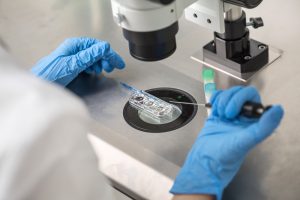A drug that works through the body’s natural hormonal system ‘kispeptin’ has the potential to treat reproductive health problems in women, according to research. Kisspeptin is a naturally occurring hormone that controls levels of other reproductive hormones in the body and plays an important role in fertility, reproductive health and the regulation of normal menstrual cycles.
Kisspeptin Can Stimulate Ovulation
Reproductive health problems are common among women around the world. Although great progress has been made in developing treatments for infertility and other reproductive disorders, the need for more effective therapies remains. One in 10 women will be diagnosed with PCOS (one of the most common hormonal disorders in women of childbearing age) or hypothalamic amenorrhea (HA), a condition characterized by the absence of a woman’s period. Current treatments for these conditions include dietary changes, medications to treat infertility by restoring ovulation, and IVF treatment for those who still cannot become pregnant. However, women with PCOS who undergo IVF are at increased risk of “ovarian hyperstimulation syndrome” (OHSS) – a potentially life-threatening side effect of IVF treatment.
The naturally occurring form of kisspeptin called kisspeptin-54 (KP54) has been researched for several years as a treatment for reproductive disorders; previous work has shown that kisspeptin can be used to stimulate ovulation in women undergoing in vitro fertilization (IVF). However, there are some limitations to using the naturally occurring kisspeptin hormone as its effectiveness wears off after a few hours.
New Drug Ensures Longer Hormone Release
Researchers at Imperial College London and clinicians at Imperial College Healthcare NHS Trust wanted to find out whether MVT-602 could target the kisspeptin signaling pathway and provide longer hormone release than the naturally occurring form of kisspeptin – leading to the use of kisspeptin to treat reproductive disorders important is. To this end, they conducted a study on 24 women aged 18 to 35 at Hammersmith Hospital, part of Imperial College Healthcare NHS Trust, from 2017 to 2019. 12 of the women were healthy, the other 12 had either PCOS or HA. All women received MVT-602. In addition, all healthy women received an injection of the naturally occurring kisspeptin (KP54) and a saline placebo for comparison. The researchers then compared the women’s reproductive hormone levels after taking MVT-602 with naturally occurring kisspeptin (KP54). They also compared reproductive hormone levels after MVT-602 between healthy women, women with HA and those with PCOS.
They found that all women given MVT-602 had longer increases in reproductive hormones, particularly luteinizing hormone (LH) and follicle-stimulating hormone (FSH), than when they received native kisspeptin (KP54). LH levels peaked 21-22 hours after MVT-602 and remained elevated for 48 hours. This compares to natural kisspeptin (KP54), where LH levels peaked 4.7 hours after administration and remained elevated for 12-14 hours. Therefore, the duration of the LH surge was increased approximately fourfold with MVT-602. The LH surge after MVT-602 was similar in PCOS and healthy women, but rose faster in women with HA. Theoretically, this could be because women with HA, due to their condition, have more kisspeptin receptors in the brain’s hypothalamus, where kisspeptin works.
This study suggests that MVT-602 can stimulate kisspeptin for a longer period of time without side effects, meaning it could potentially be used to treat a wider range of reproductive disorders such as PCOS and hypothalamic amenorrhea. However, more research is needed to fully characterize its effects in specific disorders affecting reproductive health.





